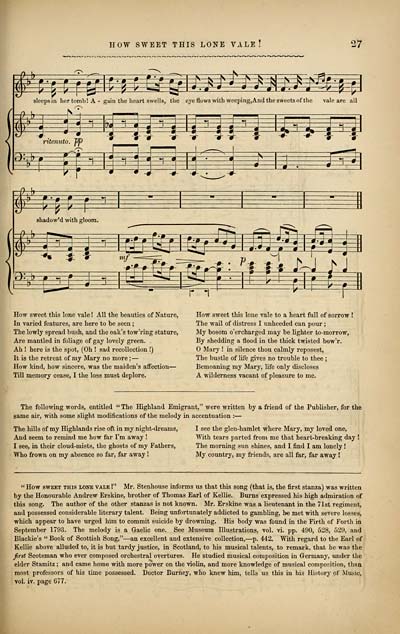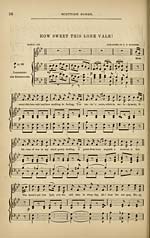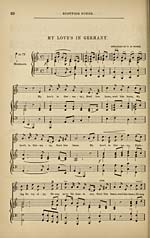Inglis Collection of printed music > Printed music > Songs of Scotland adapted to their appropriate melodies > Volume 1
(43) Page 27
Download files
Complete book:
Individual page:
Thumbnail gallery: Grid view | List view

HOW SWEET THIS LONE VALE!
27
^sz^^^^ m^^gm^
sleeps in her tomh! A - gain the heart swells, the eye flows with weeping,And the sweets of the vale are all
How sweet this lone vale ! All the heauties of Nature,
In varied features, are here to be seen ;
The lowly spread bush, and the oak's tow'ring stature,
Are mantled in foliage of ga3' lovely green.
Ah ! here is the spot, (Oh ! sad recollection !)
It is the retreat of ray Mary no more ; —
How kind, how sincere, was the maiden's affection —
Till memory cease, I the loss must deplore.
How sweet this lone vale to a heart full of sorrow !
The wail of distress I unheeded can pour ;
My bosom o'ercharged may be lighter to-morrow,
By shedding a flood in the thick twisted bow'r.
Mary ! in silence thou calmly reposest,
The bustle of life gives no trouble to thee ;
Bemoaning my Mary, life only discloses
A wilderness vacant of pleasure to me.
The following words, entitled "The Highland Emigrant," were written by a friend of the Publisher, for the
same air, with some slight modifications of the melody in accentuation : —
The hills of my Highlands rise oft in my night-dreams,
And seem to remind me how far I'm away !
I see, in their cloud-mists, the ghosts of my Fathers,
Who frown on my absence so far, far away !
I see the glen-hamlet where Mary, my loved one,
With tears parted from me that heart-breaking day !
The morning sun shines, and I find I am lonely !
My country, my friends, are all far, far away !
" How sweet this lone vale I" Mr. Stenhouse informs us that this song (that is, the first stanza) was written
by the Honourable Andrew Erskine, brother of Thomas Earl of Kellie. Burns expressed his high admiration of
this song. The author of the other stanzas is not known. Mr. Erskine was a lieutenant in the 71st regiment,
and possessed considerable literary talent. Being unfortunately addicted to gambling, he met with severe losses,
which appear to have urged him to commit suicide by drowning. His body was found in the Firth of Forth in
September 1793. The melody is a Gaelic one. See Museum Illustrations, vol. vi. pp. 490, 528, 529, and
Blackie's " Book of Scottish Song," — an excellent and extensive collection, — p. 442. With regard to the Earl of
Kellie above alluded to, it is but tardy justice, in Scotland, to his musical talents, to remark, that he was the
first Scotsman who ever composed orchestral overtures. He studied musical composition in Germany, under the
elder Stamitz ; and came home with more power on the violin, and more knowledge of musical composition, than
most professors of his time possessed. Doctor Burney, who knew him, tells us this in his History of Music,
vol. iv. page 077.
27
^sz^^^^ m^^gm^
sleeps in her tomh! A - gain the heart swells, the eye flows with weeping,And the sweets of the vale are all
How sweet this lone vale ! All the heauties of Nature,
In varied features, are here to be seen ;
The lowly spread bush, and the oak's tow'ring stature,
Are mantled in foliage of ga3' lovely green.
Ah ! here is the spot, (Oh ! sad recollection !)
It is the retreat of ray Mary no more ; —
How kind, how sincere, was the maiden's affection —
Till memory cease, I the loss must deplore.
How sweet this lone vale to a heart full of sorrow !
The wail of distress I unheeded can pour ;
My bosom o'ercharged may be lighter to-morrow,
By shedding a flood in the thick twisted bow'r.
Mary ! in silence thou calmly reposest,
The bustle of life gives no trouble to thee ;
Bemoaning my Mary, life only discloses
A wilderness vacant of pleasure to me.
The following words, entitled "The Highland Emigrant," were written by a friend of the Publisher, for the
same air, with some slight modifications of the melody in accentuation : —
The hills of my Highlands rise oft in my night-dreams,
And seem to remind me how far I'm away !
I see, in their cloud-mists, the ghosts of my Fathers,
Who frown on my absence so far, far away !
I see the glen-hamlet where Mary, my loved one,
With tears parted from me that heart-breaking day !
The morning sun shines, and I find I am lonely !
My country, my friends, are all far, far away !
" How sweet this lone vale I" Mr. Stenhouse informs us that this song (that is, the first stanza) was written
by the Honourable Andrew Erskine, brother of Thomas Earl of Kellie. Burns expressed his high admiration of
this song. The author of the other stanzas is not known. Mr. Erskine was a lieutenant in the 71st regiment,
and possessed considerable literary talent. Being unfortunately addicted to gambling, he met with severe losses,
which appear to have urged him to commit suicide by drowning. His body was found in the Firth of Forth in
September 1793. The melody is a Gaelic one. See Museum Illustrations, vol. vi. pp. 490, 528, 529, and
Blackie's " Book of Scottish Song," — an excellent and extensive collection, — p. 442. With regard to the Earl of
Kellie above alluded to, it is but tardy justice, in Scotland, to his musical talents, to remark, that he was the
first Scotsman who ever composed orchestral overtures. He studied musical composition in Germany, under the
elder Stamitz ; and came home with more power on the violin, and more knowledge of musical composition, than
most professors of his time possessed. Doctor Burney, who knew him, tells us this in his History of Music,
vol. iv. page 077.
Set display mode to: Large image | Transcription
Images and transcriptions on this page, including medium image downloads, may be used under the Creative Commons Attribution 4.0 International Licence unless otherwise stated. ![]()
| Special collections of printed music > Inglis Collection of printed music > Printed music > Songs of Scotland adapted to their appropriate melodies > Volume 1 > (43) Page 27 |
|---|
| Permanent URL | https://digital.nls.uk/94707488 |
|---|
| Shelfmark | Ing.127 |
|---|---|
| Additional NLS resources: | |
| Attribution and copyright: |
|
| Description | Scottish and English songs, military music and keyboard music of the 18th and 19th centuries. These items are from the collection of Alexander Wood Inglis of Glencorse (1854 to 1929). Also includes a few manuscripts, some treatises and other books on the subject. |
|---|
| Description | The Glen Collection and the Inglis Collection represent mainly 18th and 19th century Scottish music, including Scottish songs. The collections of Berlioz and Verdi collected by bibliographer Cecil Hopkinson contain contemporary and later editions of the works of the two composers Berlioz and Verdi. |
|---|

